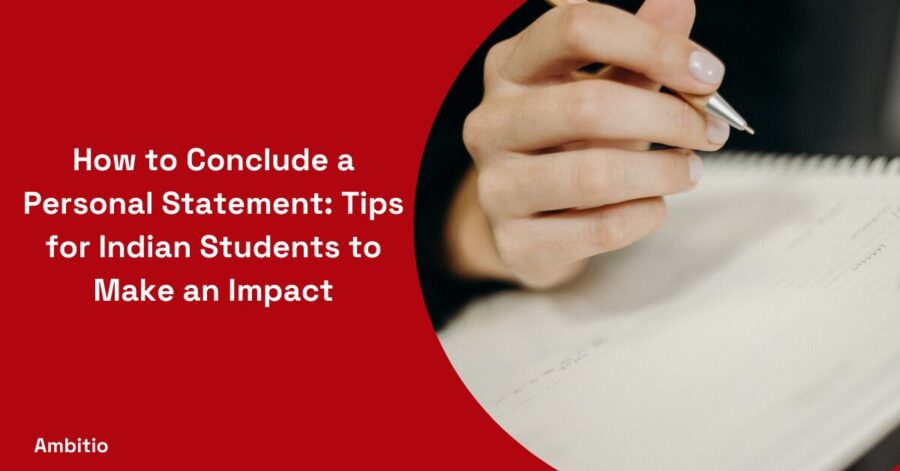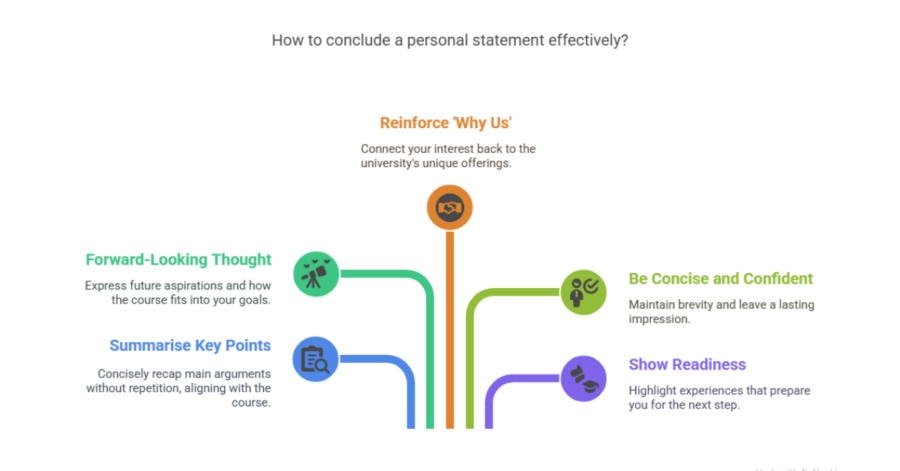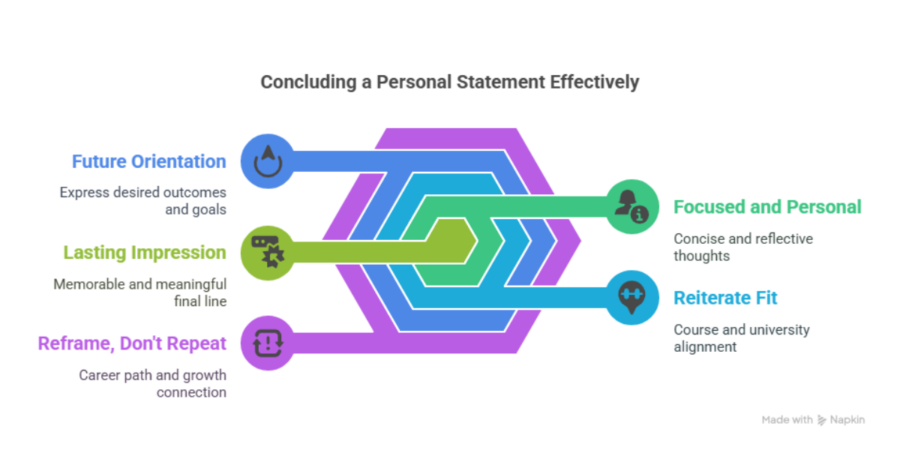6 May 2025
6 minutes read
How to Conclude a Personal Statement: Tips for Indian Students to Make an Impact

Key Takeaways
- How to conclude personal statement effectively: tie back to your purpose, avoid clichés, and end with clarity and confidence.
- Indian students often rush the last paragraph, missing a key opportunity to impress university admissions teams.
- Ambitio offers expert SOP and profile-building support to help you craft a memorable, impact-driven application.
“The last paragraph of your personal statement is what sticks- make it count.” Unfortunately, when it comes to personal statements, 80% of Indian students take the last paragraph for granted and not just make a mental misstep, but rush it without thinking and make a weak impression on the admissions officer. The truth is that most of the students don’t understand how to conclude personal statements adequately without being repetitive, vague, or dramatic.
If you happen to be one of them, you certainly won’t be the first. As an applicant, your conclusion is more than just a way to end your personal statement, it is your last opportunity to reinforce your ambitions, show clarity, and link back to your driving purpose. Let’s fix what most overlook, the ending that makes an impact.
Why the Personal Statement Ending Matters More Than You Think?
It’s important for Indian students applying via UCAS to know how to end a personal statement. The conclusion isn’t just a conclusion; it is your closing statement to the admissions tutor. A good conclusion will link your resume personal statement, your journey, and your objectives.

And, it will make it obvious to the admissions tutor that you fulfil the course requirements and are ready to develop your knowledge further. Lastly, the conclusion is your chance to present memorable elements from the personal statement, demonstrate your desire to study at the institution, and wrap everything up with clarity. Don’t waste this opportunity, make your personal statement unforgettable!
How do you Conclude A Personal Statement With Purpose and Clarity?
A strong personal statement conclusion should concisely summarise key points, reflect on how your experiences have shaped you, and highlight future career goals. It’s also where you connect back to the overall message, show enthusiasm, and end with a statement that demonstrates your suitability for the course.

For Indian students, the key is to keep it focused, avoid clichés, and make it personal, not just polished. To help you master how to conclude personal statement with clarity and purpose, here are some proven tips:
1. Summarise without Repeating
Don’t rehash your entire statement. Instead, pull together key points that align with the particular course and show how your journey fits into the bigger picture.
2. End with a Forward-Looking Thought
Let the admissions tutor reading your personal statement know what you’re looking forward to, whether it’s studying at university, engaging in community service, or contributing to the uni’s academic environment.
3. Reinforce the ‘Why Us’ Message
Link your interest in the university application back to the “why us” theme. Talk about how the course will help you grow, using a tone that is genuine and not overly rehearsed.
4. Be Concise and Confident
This is not the place to add new information. Stick to the word count, stay concise, and use a final line that leaves a lasting impression, a callback to your opening or a clear statement of what you want to achieve.
5. Show That You’re Ready
A great conclusion shows that you’re prepared for the next step. Whether through volunteer work or experiences together from school and internships, emphasise how it’s all led to this moment.
When Indian students write a personal statement, the conclusion often becomes an afterthought. But in reality, it’s one of the most important parts of your personal statement, the line that will echo in the mind of the admissions team.
Examples of Impactful Closing Statements for Personal Statements for Indian Students
Wondering how to conclude personal statement in a way that sticks with the admissions officer? For many Indian students, the conclusion is either rushed or filled with generic phrases.
But a great closing line should reflect who you are, where you’re going, and how your journey throughout my academic life has prepared you for the next step. Here are some strong examples tailored for different scenarios:
1. For Undergraduate Admissions (UCAS or US Universities)
“This course is the bridge between what I’ve learned throughout my academic journey and the impact I hope to create in the world—starting with your university.”
2. For Master’s Programs
“Rooted in the curiosity that has shaped me throughout my academic path, I see this program not as a destination but as the launchpad for my future in data-driven change.”
3. For PhD or Research-Based Programs
“Throughout my academic experiences, I’ve searched for depth, not just answers. This PhD will allow me to expand boundaries, not only in my field but in myself.”
4. How to End a Personal Statement for Scholarship
“Coming from a modest background, this scholarship would not just ease financial pressure—it would be a recognition of the determination I’ve shown throughout my academic career, and the future I am committed to building.”
5. For Career-Focused Programs (MBA, MIM, etc.)
“With every step throughout my academic and professional life, I’ve built towards this moment. Now, I’m ready to contribute to and grow within your program’s global community.”
Final Tips on How to Conclude a Personal Statement
Concluding your personal statement can be just as challenging as the first line, especially for Indian students navigating the UCAS personal application process. A strong conclusion is your chance to wrap up with impact, connecting everything you’ve said into a final, confident note.

It’s where you show the university admissions team that you’re not just a good fit, you’re the right fit. Here are 5 expert tips on how to conclude personal statement with clarity, confidence, and purpose:
1. Don’t Repeat, Reframe
Instead of restating the points you’ve already made in your body paragraphs, reframe them in a way that links back to your career path and self-growth throughout your academic journey.
2. Make It About the Future
Use your last line to express what you want to leave the university with skills, mindset, or impact. Show how the overall university experience will help you grow and move back to a wider goal or mission.
3. Reiterate Fit Without Clichés
A great personal statement ends with a conclusion that sets you apart. Avoid clichés and instead, briefly explain why the course and university are perfect for your goals, using specifics that tie to your statement’s opening.
4. Keep It Focused and Personal
A great ending is concise and personal. This is not the place to add new achievements. Instead, offer your final thoughts that reflect maturity, readiness, and a clear direction in the application process.
5. Leave a Lasting Impression
End your personal statement with a line that leaves something memorable, confident, and meaningful. It’s your last opportunity to talk to the admissions team, so make it the way to finish that elevates your entire application.
By applying these tips, Indian students can write not just a UCAS personal statement, but the personal statement the best version of themselves, ready for the next chapter.
10 Top Universities to Study Abroad
Over 70% of admissions officers say a compelling personal statement can tip the scales between acceptance and rejection, especially when applying to the world’s top universities. But alongside strong academics and a great SOP, it’s equally crucial to understand the financial and exam requirements of your dream schools.
Here’s a comparison of 10 top universities to study abroad, with insights into average tuition fees, average graduate salary, and exams required for admission:
| University | Average Tuition Fees (per year) | Average Graduate Salary | Exams Required |
|---|---|---|---|
| Harvard University (USA) | $54,000 | $84,000 | GRE, TOEFL/IELTS, SAT (UG) |
| University of Oxford (UK) | £27,000 | £45,000 | GRE (some PG), IELTS/TOEFL |
| Stanford University (USA) | $56,000 | $95,000 | GRE, TOEFL/IELTS, SAT (UG) |
| ETH Zurich (Switzerland) | CHF 1,300 | CHF 80,000 | GRE (some), TOEFL/IELTS |
| University of Toronto (Canada) | CAD 58,000 | CAD 70,000 | GRE (some), IELTS/TOEFL, SAT |
| University of Melbourne (Australia) | AUD 45,000 | AUD 65,000 | IELTS/TOEFL, GRE (some PG) |
| University of Cambridge (UK) | £28,000 | £50,000 | GRE (some), IELTS/TOEFL |
| National University of Singapore | SGD 38,000 | SGD 60,000 | GRE (some), IELTS/TOEFL |
| University of British Columbia (CA) | CAD 52,000 | CAD 60,000 | IELTS/TOEFL, GRE/SAT |
| Massachusetts Institute of Tech (USA) | $57,000 | $102,000 | GRE, TOEFL/IELTS, SAT (UG) |
Conclusion
Indian students often overlook the final lines, but if you’re wondering how to conclude personal statement, remember this: it’s your moment to shine. Be clear, show direction, and most importantly, avoid cliches. If you’re about to start writing or stuck midway, focus on writing a great finish that feels authentic and goal-oriented.
Want expert help to craft the perfect ending?
Join Ambitio, India’s leading study abroad consultancy, trusted for personalized profile building and SOP guidance.
FAQs
What is the main purpose of the conclusion in a personal statement?
The main purpose is to reinforce your key message and leave a lasting impression, showing you understand how to conclude personal statement effectively.
Should I introduce new information in the conclusion?
No, how to conclude personal statement best is by summarizing existing points, not adding new information.
How can I effectively summarize my main points?
Briefly restate your strongest experiences or skills, showing you know how to conclude personal statement with impact.
Is it effective to restate my central theme or message?
Yes, restating your central theme is a great technique on how to conclude personal statement memorably.
Can I use a quote or a question in my conclusion?
You can, if it ties back to your main message and enhances how to conclude personal statement.
How do I connect my past experiences to my future goals?
Show how your experiences have prepared you for your goals, which is key in how to conclude personal statement.
What is the ideal length for a personal statement conclusion?
Keep it concise-about 1-2 paragraphs-demonstrating you understand how to conclude personal statement within word limits.

You can study at top universities worldwide!
Get expert tips and tricks to get into top universities with a free expert session.
Book Your Free 30-Minute Session Now! Book a call now




























